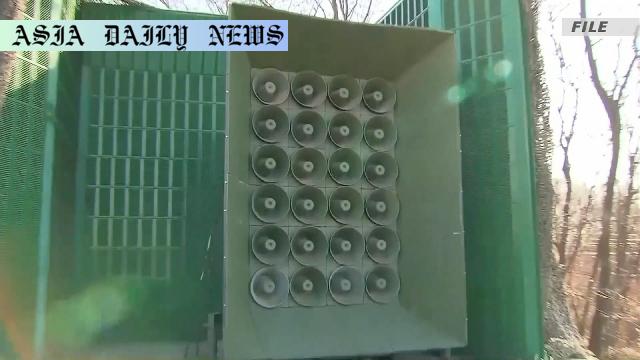Inter-Korean Relations: The South Korean government suspends loudspeaker broadcasts in a bid to foster peace and dialogue.

Introduction to South Korea’s Bold Move
In a significant gesture toward peace and diplomacy, South Korea has suspended its loudspeaker announcements along the inter-Korean border. This development, marking a shift from the policies of the previous administration, comes as part of President Lee Jae-myung’s broader commitment to improving inter-Korean relations. The suspension of these broadcasts, which began in response to provocative actions by North Korea, is a symbol of the new administration’s effort to rebuild trust and pave the way for dialogue.
A Historical Context
The broadcasts, initiated in June of the previous year, were South Korea’s response to North Korea’s controversial balloon launches across the border. These activities strained inter-Korean ties further, as they symbolized an increase in hostility. The Demilitarized Zone (DMZ), already a tense area, became a platform for subtle and overt confrontational activities. By halting these broadcasts, South Korea’s new government demonstrates a clear intent to move away from reactionary measures and toward a strategy rooted in dialogue and understanding.
President Lee’s Vision for Peace
President Lee Jae-myung has been in office for less than a week, yet his actions already reflect the promises made during his campaign. His vision centers around fostering communication channels between the two Koreas, promoting dialogue over aggression. This recent decision complements his pledge to chart a conciliatory course in dealing with Pyongyang. By easing actions that North Korea perceived as hostile, South Korea intends to create an environment conducive to peaceful discussions and trust-building.
The Role of Private Organizations
Beyond halting the loudspeaker broadcasts, the administration has also requested private organizations to suspend their anti-Pyongyang leaflet campaigns. These leaflet drops, often containing critical propaganda against the North Korean government, have been a contentious issue. The administration recognizes that such actions, while unofficial, have added to the tension between the nations. By addressing these issues comprehensively, the government aims to approach North Korea on a united front, signaling a genuine desire for peace and cooperation.
Analysis of the Decision
This move by the South Korean government has far-reaching implications. Symbolically, it demonstrates a willingness to leave behind the cycle of provocation and counter-provocation. Practically, it may open avenues for renewed discussions and formal negotiations. However, the success of this initiative largely depends on North Korea’s response. Will Pyongyang view this as a sign of goodwill, or will it be dismissed as mere optics? The coming weeks will be pivotal in assessing the impact of South Korea’s efforts toward achieving lasting peace on the Korean Peninsula.
Concluding Thoughts
President Lee Jae-myung’s actions signify a fresh approach to inter-Korean relations, emphasizing reconciliation and dialogue over confrontation. While the path to peace is fraught with challenges, this step marks a positive beginning. By addressing the issues of trust and communication, South Korea is laying the groundwork for a future where cooperation could replace decades of tension. The international community will undoubtedly follow these developments closely, recognizing their potential to reshape the dynamics of the Korean Peninsula.
Commentary
The Significance of South Korea’s Trust-Building Efforts
South Korea’s decision to suspend loudspeaker broadcasts along the inter-Korean border is not just a tactical move—it’s a profound gesture of trust-building. In a region permeated by decades of conflict and hostility, such measures hold immense symbolic and practical value. This act represents a deliberate effort by President Lee Jae-myung to shift the narrative, moving away from aggression and toward dialogue and understanding. It is both a bold and calculated step to reset South-North relations on a more conciliatory foundation.
The Importance of Diplomacy and Dialogue
For too long, the Korean Peninsula has been shaped by cycles of provocation and retaliation. Each side has responded to the other’s actions with escalating measures, deepening mistrust and reducing the likelihood of constructive engagement. President Lee’s administration has chosen to break from this pattern by taking a proactive stance. Diplomacy, when wielded with sincerity and intention, has the potential to achieve what threats and countermeasures never can—a lasting and meaningful peace.
Challenges and the Road Ahead
While this decision is a commendable start, it is by no means the solution to decades of tension. The ultimate goal of peace on the Korean Peninsula requires consistent efforts, mutual respect, and substantial compromises from both sides. North Korea’s response to this measure will be critical in determining its success. Only through continued trust-building measures and open communication can the two Koreas hope to resolve their differences and achieve unity.
Conclusion: A Step in the Right Direction
As observers of global affairs, we must acknowledge and appreciate the courage it takes to initiate such a change. South Korea’s new approach under President Lee Jae-myung deserves recognition for prioritizing peace and dialogue. While the path ahead remains uncertain, each step forward—no matter how small—brings the promise of a brighter, more peaceful future for the Korean Peninsula. Let us hope these efforts inspire similar initiatives in other regions marked by tension and conflict.


